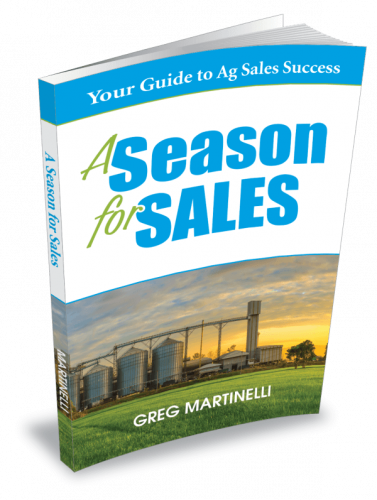The 1 question you need to ask every farmer you sell to during an inflation
Remember that childhood challenge from the local bully? The one that sounded something like,
“Yeah? So, what are you going to do about it?”
Well, it might just be a great solution to the current environments you are running into when selling to farmers in today’s inflationary markets.
The bully asked this question because they felt you had no options. Meaning, they were going to say or do whatever they wanted. You were just going to have to deal with it. In many of those cases, you agreed that you had no choice and just let it go.
The farmers you sell to today feel that very same way. The only thing is the bully in this case is inflation, rising interest rates, and fluctuating grain markets. And those bullies don’t care whether or not your farmers make a profit.
Look at the price of land and equipment. Two of the biggest assets on a farmer’s balance sheet. They have skyrocketed, despite a disconnect to grain markets. The cost of money has begun to go back to what many of us think of as normal (6+% versus 2-3%). The producer’s price of seed has gone up as well. None if these have a history of going up and then back down. They simply go up and stay up until they go higher. Fertilizer and fuel tend to fluctuate, but the inflationary products are on the rise right now.
As a salesperson calling on farmers, this can seem like an unwinnable discussion. The farmer lays this negative onslaught onto any salesperson who calls on them. And as a good salesperson, you want to help. So, you come up with solutions or comments that may come from your internal company sources and they may make sense to you. Yet, make no sense to your customers. These solutions are typically met with disagreement from your stressed farmer customer.
One question can provide some help:
“With all that going on, what do you think you will do?” This is a preferred style versus my original format of “So what are you going to do about it?”
Then listen very-very close. This question should change their focus of thinking. When someone is listing out a litany of negative thoughts, it is similar to when they are complaining to you about your company or your products. It’s called the “monkey” brain” or the “original brain”. Their only thought is to “rage” about the bad. When you ask them a question, it forces them into a different thought pattern. All of a sudden, they have to stop the rage and consider how to answer you.
A second question that can be extremely helpful in multiple situations:
“What did you do when this happened before?” This isn’t the first difficult farming market we have been through. Here are a few others:
- The 1970s inflation. Probably their parents or grandparents can shed some light on how they weathered it. If you have someone in your business who was around for those days, then ask them how customers survived during those times.
- The 1980s interest rate spike. Again, their parents or grandparents can provide some thoughts here.
- The 2000s ethanol boom – this was a boom for grain farmers but very difficult times for livestock producers as the cost of their feed went up.
- The hog market price drops in the 90s.
A couple of key points:
- Don’t ask these questions if they are red-faced and spitting-mad. Let them finish and calm down just a bit.
- Have somewhat of a ballpark answer for this question. If a producer is angry and you ask this question, they might jab back abruptly, “I don’t know! What you do? Your company is so smart, what do they think?” Instead of taking the bait and answering what I think or what my company thinks, I try to answer this type of question with options that other producers are trying. The reason is that, neither me nor my company are farmers. So, any answer I give from us is going to appear as either ill-advised or just trying to promote sales. However, the farmer can’t deny that farmers just like him are choosing these solutions.
Final thoughts on this situation:
- If you are new in the sales world, this will not be the last time you sell into a tough market. In thirty years, there have been three major tough markets that my customers went through. Each time most survived it, and most made adjustments to those conditions. As a sales professional, I found this to be a time when I could add great value to a customer. It was a time when they needed me more as a trusted advisor than when times were good.
- The world population is growing and more of them want three meals a day. The world will not stop farming. This means there will be a solution and you don’t have to take on the burden of solving it yourself. Your suppliers have increased prices. You have increased prices. Labor has increased in cost (if you can even find labor). However, I don’t know one person that has stopped eating. Every field somehow gets planted.
Good luck with your sales calls today and at some point, in your conversations today or tomorrow, it’s going to happen. The negative market factors are going to come pouring out all over your sales call.
Ask, “Yeah, you are right. How are you planning to get through it all?” “What are your neighbors doing to stay in farming?”


